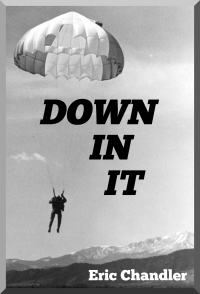I helped put on a writing workshop this summer called Bridging the Gap. During the workshop, I was reading The Things They Carried by Tim O’Brien. The whole point of the workshop was to get stories into the world, so this paragraph rang out like a bell:
Forty-three years old, and the war occurred half a lifetime ago, and yet the remembering makes it now. And sometimes remembering will lead to a story, which makes it forever. That’s what stories are for. Stories are for joining the past to the future. Stories are for those late hours in the night when you can’t remember how you got from where you were to where you are. Stories are for eternity, when memory is erased, when there is nothing to remember except the story.
Helping people tell their military-themed stories over a weekend in Duluth felt like a sacred mission after reading that. But there was a lot more in the book than that.
One thing that struck me was the repetition of episodes that happened to his friends. Especially the circumstances around the death of Curt Lemon: stepping on an explosive and blown into a tree. I read a press release last week that Tim O’Brien was hired as a consultant for the TV show “This Is Us.” In that article, The Things They Carried was described as a collection of stories with an “intertwined structure.” Maybe so, but to me it felt more like repetition. Names of his service buddies came up again and again, the episodes again and again. By the end of the book, I knew who those people were, even though each story might only mention them briefly. The repetition may have been a conscious effort, or maybe it just mirrored how often those events rose unbidden into O’Brien’s mind. Like some memories appear in mine over and over again at random times.
I’ve been trying to piece together a memoir (which I’m sure will dramatically improve the quality of the canon). I’ve been thinking a lot about memory, and I appreciated how O’Brien references memory and the attempt to tell about events from the past:
I’m forty-three years old, and a writer now, and the war has been over for a long while. Much of it is hard to remember. … the remembering is turned into a kind of rehappening. … The bad stuff never stops happening: it lives in its own dimension replaying itself over and over.
So, I got some nuggets about story, repetition/structure, and memory from O’Brien’s book. But the most interesting and ultimately transformative thing the book did to me was shake my opinion of truth a little bit. In Writing War: A Guide to Telling Your Own Story, Ron Capps says this regarding non-fiction:
When we write non-fiction, we make a contract with the reader (and with our editor and our publisher and all of their lawyers) that what we write is true. Not mostly true or pretty much the way things happened, except that we left out the stuff that didn’t make us look good. The truth.
This statement makes sense to me. It’s part of the reason I’m stalled and get more stalled as time goes by. I have to look back and determine what really happened. The farther I get in time from those events, the harder it is to determine the truth. To believe in my own memory. My procrastination leads to more passage of time and that leads to more doubt. Even so, I believe that Capps is right.
Chris Lyke at Line of Advance said something to me once about O’Brien not making a distinction between fiction and non-fiction. I didn’t understand what he was saying (and due to my bad memory, may even be remembering the discussion wrong). I mean, how could there be no distinction between fiction and non-fiction?
For me, the book pivots around the chapter titled “How to Tell a True War Story.” I can tell because that’s the part that’s all dog-eared and full of extra ink from me. In this chapter, O’Brien addresses (as he says later in the book) “why story-truth is truer sometimes than happening-truth.”
O’Brien almost seems at odds with himself. On one hand he says, “True war stories do not generalize. They do not indulge in abstraction or analysis.” To me this sounds like an argument for truth in non-fiction. But then, he also says, “All you can do is tell it one more time, patiently, adding and subtracting, making up a few things to get at the real truth….You can tell a true war story if you just keep on telling it.” This sounds like how you validate highbrow fiction: the story is fake, but it reveals a deeper truth.
So, which is it? Maybe O’Brien purposefully blurs the line between fact and fiction out of self-preservation. My experiences in war were nowhere near as difficult as O’Brien’s. I don’t know what mental gymnastics he needed to do to get his stories out. I’ll be damned if I’m going to judge him. But this quote might hint at something:
“Daddy, tell the truth,” Kathleen can say, “did you ever kill anybody?” And I can say, honestly, “Of course not.”
Or I can say, honestly, “Yes.”
As for me, I remain in the Ron Capps camp. I’m going to make the effort to tell it straight, to the best of my ability. Otherwise, I’ll clearly label it fiction. O’Brien lets me choose my own storytelling path by saying:
You can tell a true war story by the questions you ask. Somebody tells a story, let’s say, and afterward you ask, “Is it true?” and if the answer matters, you’ve got your answer.
Zen kōans like that are often unsatisfying. But the ambiguity in O’Brien’s discussion of truth may be the most honest thing about the book.










I enjoyed this. Keep going.
Thanks, Will!